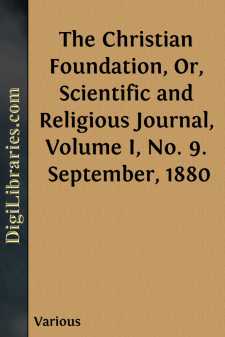Categories
- Antiques & Collectibles 13
- Architecture 36
- Art 48
- Bibles 22
- Biography & Autobiography 813
- Body, Mind & Spirit 142
- Business & Economics 28
- Children's Books 17
- Children's Fiction 14
- Computers 4
- Cooking 94
- Crafts & Hobbies 4
- Drama 346
- Education 46
- Family & Relationships 57
- Fiction 11829
- Games 19
- Gardening 17
- Health & Fitness 34
- History 1377
- House & Home 1
- Humor 147
- Juvenile Fiction 1873
- Juvenile Nonfiction 202
- Language Arts & Disciplines 88
- Law 16
- Literary Collections 686
- Literary Criticism 179
- Mathematics 13
- Medical 41
- Music 40
- Nature 179
- Non-Classifiable 1768
- Performing Arts 7
- Periodicals 1453
- Philosophy 64
- Photography 2
- Poetry 896
- Political Science 203
- Psychology 42
- Reference 154
- Religion 513
- Science 126
- Self-Help 84
- Social Science 81
- Sports & Recreation 34
- Study Aids 3
- Technology & Engineering 59
- Transportation 23
- Travel 463
- True Crime 29
The Christian Foundation, Or, Scientific and Religious Journal, Volume I, No. 9. September, 1880
by: Various
Categories:
Description:
Excerpt
THE DIVINITY OF OUR RELIGION AS CONCEDED BY ITS ENEMIES.
Voltaire says, "I am ever apprehensive of being mistaken; but all monuments give me sufficient evidence that the polished nations of antiquity acknowledged a supreme God. There is not a book, not a medal, not a bas-relief, not an inscription, in which Juno, Minerva, Neptune, Mars, or any of the other deities, is spoken of as a creating being, the sovereign of all nature.
"On the contrary, the most ancient profane books that we have—Hesiod and Homer—represent their Zeus as the only thunderer, the only master of gods and men; he even punishes the other gods; he ties Juno with a chain, and drives Apollo out of heaven.
"The ancient religion of the Brahmins explains itself in a sublime manner, concerning the unity and power of God, in these words found in the 2d chapter of the Shastah, 'The Eternal, absorbed in the contemplation of his own existence, resolved, in the fullness of time, to communicate his glory and his essence to beings capable of feeling and partaking his beatitude, as well as of contributing to his glory. The Eternal willed it, and they were. He formed them partly of his own essence, capable of perfection or imperfection, according to their will. The Eternal first created Brahma, Vishna and Siva, then Mozazor and all the multitude of the angels. The Eternal gave the pre-eminence to Brahma, Vishna and Siva. Brahma was the prince of the angelic army. Vishna and Siva were his coadjutors. The Eternal divided the angelic army into several bands, and gave to each a chief. They adored the Eternal, ranged around his throne, each in the degree assigned him. There was harmony in heaven.'
"The Chinese, ancient as they are, come after the Indians. They have acknowledged one only God. They have no subordinate gods. The Magi of Chaldea, the Sabeans, acknowledge but one supreme God, whom they adored in the stars, which are his work. The Persians adored him in the sun. The sphere placed on the frontispiece of the temple of Memphis was the emblem of one only and perfect God, called Knef by the Egyptians. The title of Deus Optimum Maximus was never given by the Romans to any but Jupiter." Voltaire adds, "This great truth, which we have elsewhere pointed out, can not be too often repeated. Jupiter was the translation of the Greek word Zeus, and Zeus a translation of the Phenician word Jehovah."—Philosophical Dictionary, vol. 1, pp. 374, 375.
Ever remember, that there is, in all the ancient theories of gods, the grand idea of one supreme God. Unbelievers keep this great truth out of sight.
R. Dale Owen says of Christ, "His character and his doings, as exhibited in the gospel biographies—are almost as marvellous as the system he gave to the world. They accord neither with his country nor with his time, nor—except as one illustrious example disclosing to us what man may be—with that human race with which, on a hundred occasions, he expressly identified himself. It were difficult in this connection, to improve on the words of an anglican clergyman, whose early death was a misfortune to the church he adorned. 'Once in the roll of ages, out of innumerable failures, from the stock of human nature, one bud developed into a faultless flower. One perfect specimen of humanity has God exhibited on earth. As if the life blood of every nation were in his veins, and that which is best and truest in every man, and that which is tenderest and gentlest and purest in every woman, were in his character; he is emphatically the Son of Man.' 'Christ is the crowning exemplar of the Inspired; for he, while abiding among us, lived, more nearly than any other of God's creatures here, within sight and hearing of his future home. Therefore it is that his teachings are the noblest fruits of inspiration.'"
A.J. Davis says: "He (Christ) was A TYPE OF A PERFECT MAN, both in physical and spiritual qualifications. His general organization was indeed remarkable, inasmuch as he possessed, combined, the perfection of physical beauty, mental powers and refined accomplishments. He was generally beloved during his youth for his great powers of discernment, his thirst after knowledge, and his disposition to inquire into the causes of mental phenomena, of the conditions of society, and of the visible manifestations of nature. He was also much beloved for his PURE natural sympathy for all who were suffering afflictions either of a physical or mental character—It is true that at the age of twelve years he was admitted to the presence of the learned doctors....












